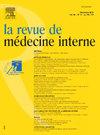[脚本一致性测试专家小组:真正充分的参考资料?]
IF 0.9
4区 医学
Q3 MEDICINE, GENERAL & INTERNAL
引用次数: 0
摘要
脚本一致性测试(SCT)是根据法令于 2024 年在法国医科学生国家排名考试中引入的一种考试方式。其目的是评估在不确定情况下的临床推理能力。在实践中,SCT 根据真实的临床场景,评估新信息对先验假设概率的影响。这种方法类似于概率(或贝叶斯)推理。由于所探究的临床情景具有不确定性,因此 SCT 不会将学生的反应与理论知识参考中的预期反应进行比较。取而代之的是,利用经验丰富的医生小组的回答分布来确定问题的评分标准。文献数据表明,即使是经验丰富的医生,也会像大多数人一样,经常表现出有偏差的直观概率推理。这些偏差使人们对使用专家小组的回答作为小班教学评分标准的相关性产生了疑问。本文章由计算机程序翻译,如有差异,请以英文原文为准。
Le panel d’experts pour les tests de concordance de script : une référence réellement adéquate ?
The Script Concordance Tests (SCTs) are an examination modality introduced by decree in the French National Ranking Exam for medical students in 2024. Their objective is to evaluate clinical reasoning in situations of uncertainty. In practice, SCTs assess the impact of new information on the probability of a hypothesis formulated a priori based on an authentic clinical scenario. This approach resembles probabilistic (or Bayesian) reasoning. Due to the uncertainty associated with the explored clinical situation, SCTs do not compare the student's response to an expected one in a theoretical knowledge reference. Instead, the distribution of responses from a panel of experienced physicians is used to establish the question's scoring scale. Literature data suggest that physicians, even experienced ones, like most humans, often exhibit biased intuitive probabilistic reasoning. These biases raise questions about the relevance of using expert panel responses as scoring scales for SCTs.
求助全文
通过发布文献求助,成功后即可免费获取论文全文。
去求助
来源期刊

Revue De Medecine Interne
医学-医学:内科
CiteScore
0.70
自引率
11.10%
发文量
526
审稿时长
37 days
期刊介绍:
Official journal of the SNFMI, La revue de medecine interne is indexed in the most prestigious databases. It is the most efficient French language journal available for internal medicine specialists who want to expand their knowledge and skills beyond their own discipline. It is also the main French language international medium for French research works. The journal publishes each month editorials, original articles, review articles, short communications, etc. These articles address the fundamental and innumerable facets of internal medicine, spanning all medical specialties. Manuscripts may be submitted in French or in English.
La revue de medecine interne also includes additional issues publishing the proceedings of the two annual French meetings of internal medicine (June and December), as well as thematic issues.
 求助内容:
求助内容: 应助结果提醒方式:
应助结果提醒方式:


